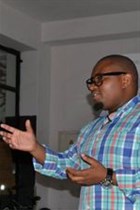
Top stories





Marketing & MediaAds are coming to AI. Does that really have to be such a bad thing?
Ilayaraja Subramanian 1 day

More news
















“According to the GEM 2017/2018 report, total early-stage entrepreneurial activity (TEA) in South Africa is at 11.0%, 4.1 percentage points higher compared to 2016’s score of 6.9%. Apart from the country's 4.1 percentage points TEA growth, entrepreneurial intentions have also increased in the last few years to 11.7%, up from 10.1% in 2016/17.” (Business Report, 2018)According to an article by Brand South Africa, entrepreneurs who start businesses are motivated by various factors, not limited to, but include; ‘I wanted to be my own boss’ – 22%, ‘It makes me happy’ – 10% and ‘I was unable to find a job’ – 4% (Brand South Africa, 2017).
Whilst there are various reasons why people start businesses, business principles still apply. When operating a business, regardless of the scale, one still needs financial management skills, sales, marketing, employees, etc., and these are some of the key principles or pillars of running a successful business.
For many businesses, less focus is often placed on ‘brand’. Businesses are started or built, but few entrepreneurs prioritise ‘brand’ as an important aspect to their businesses. Whilst businesses need to create profits, I caution against entrepreneurs solely focusing on selling or sales.
I believe that exponential business success is predicated on a strong brand. A brand that is strong has the ability to increase the perceived value of products or services offered by a company. Why is it that a particular brand can command a higher or premium price, and its competitors can’t? For example; Vaseline Men and Nivea Men body lotions (400ml) costs R50+ respectively, whilst Clere For Men body lotion, also 400ml, costs R20+.
Why is this? One can argue about the different approaches employed by the respective companies, but after having conducted a mini-experiment or test on both Vaseline and Clere, the conclusion I landed on is that both these brands have good quality products. If the two brands products that are on par in terms of quality, why does one brand cost so much? It’s simple; it all boils down to the power (or lack thereof) of a brand and how each company chooses to position itself against the market players.
Brands become successful not because of what they sell, but the attractiveness of the brand and the perceived value.
By focusing on building a brand, business growth is inevitable. This is not to say that other factors may not influence either the success or failure – nothing works in isolation, but regardless of the external influences, having a strong and powerful brand with good equity is always a plus. A strong brand gives people a reason to buy, a reason to choose your brand over what is available, a reason to pay more. A ‘brand’ makes up for what logic fails to encapsulate.
Virgin brand
Virgin was born out of frustration (see what I did there?). When the Virgin brand was launched, the different ventures that Richard Branson got into were not necessarily new ideas, they were ventures in existing industries that he made us think differently about. He started Virgin Records, a record label, Virgin Active, Virgin Galactic and Virgin Trains in other countries. What all these ventures have in common is the brand ‘Virgin’ or brand Richard. The brand is irreverent and that’s exactly what makes it different and attractive. It is more than what it ‘sells’.
Apple brand
Experts and those who understand the technical aspects of technology and what goes into making computers, will tell you that Apple products aren’t necessarily superior to HP, IBM and or Samsung respectively, but the perception is that Apple is way better. In business, perception is everything. These positive perceptions around Apple can be linked to ‘brand’ and ‘purpose’. Apple doesn’t make computers and other technologies because it has the capabilities, but rather because it has a higher reason for being. Their adverts and brand building efforts highlight this purpose. Which is why their pay-off line says; 'Think Different'.
MoFaya brand
Dj Sbu and MoFaya are a classic South African case study for building a business premised on a ‘brand’. MoFaya is not just an energy drink, it is an energy drink for the Hustlers. DJ Sbu calls it; ‘iColdrink yase Kasi’ (Cooldrink for the township). By packaging or articulating it in that manner, MoFaya all of a sudden becomes more than just an energy drink.
The list of brands that are bigger in terms of value and perception is endless; Toyota, VW, DStv, Nike, Adidas, McDonald’s, KFC, etc.
In a study completed, entrepreneurs identified the following as their biggest challenges (Brand SA, 2017):
What the above highlight is a covert revelation of lack of time and effort spent on building a brand.
To be continued... Part two coming soon.
